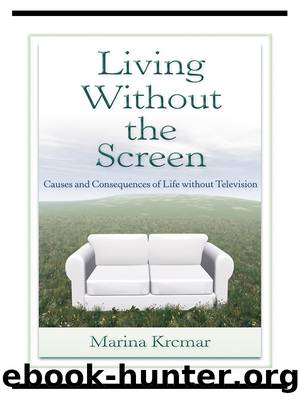Living Without the Screen by Krcmar Marina;

Author:Krcmar, Marina;
Language: eng
Format: epub
Publisher: Taylor & Francis Group
Published: 2011-03-01T00:00:00+00:00
Television as Authority
For a majority of Americans, their primary contact with news and politics is via television (Pew Research Center, 2005). Although the Internet is achieving growing importance and newspapers, while usage is down, still provide access to political information, it is television that puts a living, moving face on the news. However, as McLeod, Kosicki and McLeod (2002) argue, politicians âlearn to speak in brief sound bites, and advertisements are increasingly limited in length. Neither affords the opportunity for any sustained political reasoning, even if the candidates were inclined to reasonâ. In other words, television, by virtue of its brief sound bites and reliance on images, is not a medium that lends itself easily or willingly to sustained political discourse on complex and nuanced issues. Therefore, one problem with television as a source of political information is that, as a medium, it may be ill-suited to conveying multiple points of view or the finer details and minor distinctions that are so important in political and social issues.
In addition to the images themselves, the viewersâ own processing strategies may affect how television news becomes an individualâs political reality. Again, critical scholars and social scientists offer support for the role of television in influencing our social realities. Consider Bourdieu (1996) who argues, âThe political dangers inherent in the ordinary use of television have to do with the fact that images have the peculiar capacity to produce what literary critics call a reality effect. They show things and make people believe in what they showâ. According to Bourdieu, televisionâs ability to convince us that what is shown and what is said is somehow a direct and unadulterated version of truth creates a situation in which viewers accept messages without the critical stance that is necessary to make decisions about complex issues. Television, or more specifically television news relating to politics, does not present us with news that is framed as a version of what happened. Rather, television news is framed as fact. Bourdieu further argues that âone thing leads to another and ultimately, television, which claims to record reality, creates it instead. We are getting closer and closer to the point where the social world is primarily describedâand in a sense prescribedâby televisionâ (p. 22). In other words, if television presents a version of reality, but calls it reality, it has, in an instant, taken a bias and given it roots.
Although Bourdieuâs (1996) argument is incendiary, quantitative research has supported his theoretical positions. Take, for example, cultivation theory (Gerbner, 1969). Cultivation theory is one of the most frequently cited theories in the media effects literature. Its straightforward premise argues that the more television we watch, the more our view of reality begins to match the one presented on television. Although cultivation initially focused on television violence, suggesting that the excess of violence on television contributed to viewersâ belief that the world was a mean and frightening place, more recent research has examined many aspects of television reality (Gerbner, Gross, Morgan, Signorielli & Shanahan, 2002).
Download
This site does not store any files on its server. We only index and link to content provided by other sites. Please contact the content providers to delete copyright contents if any and email us, we'll remove relevant links or contents immediately.
Cecilia; Or, Memoirs of an Heiress — Volume 1 by Fanny Burney(32053)
Cecilia; Or, Memoirs of an Heiress — Volume 3 by Fanny Burney(31449)
Cecilia; Or, Memoirs of an Heiress — Volume 2 by Fanny Burney(31401)
The Lost Art of Listening by Michael P. Nichols(7154)
We Need to Talk by Celeste Headlee(5411)
Asking the Right Questions: A Guide to Critical Thinking by M. Neil Browne & Stuart M. Keeley(5353)
On Writing A Memoir of the Craft by Stephen King(4658)
Dialogue by Robert McKee(4156)
Pre-Suasion: A Revolutionary Way to Influence and Persuade by Robert Cialdini(3973)
I Have Something to Say: Mastering the Art of Public Speaking in an Age of Disconnection by John Bowe(3774)
Elements of Style 2017 by Richard De A'Morelli(3235)
The Book of Human Emotions by Tiffany Watt Smith(3137)
Fluent Forever: How to Learn Any Language Fast and Never Forget It by Gabriel Wyner(2915)
Name Book, The: Over 10,000 Names--Their Meanings, Origins, and Spiritual Significance by Astoria Dorothy(2835)
Good Humor, Bad Taste: A Sociology of the Joke by Kuipers Giselinde(2821)
Why I Write by George Orwell(2771)
The Grammaring Guide to English Grammar with Exercises by Péter Simon(2646)
The Art Of Deception by Kevin Mitnick(2621)
Don't Sleep, There Are Snakes by Daniel L. Everett(2496)
